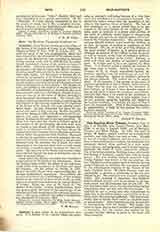

Javouhey, ANNE-MARIE, VENERABLE, foundress of the Sisters of St. Joseph of Cluny, b. at Chamblanc, Diocese of Dijon, November 11, 1779: d. July 15, 1851. In 1819 the scope of the new congregation, which had been founded for the alleviation of the miseries consequent on the Revolution, was extended to embrace foreign mission work, and in 1822 Mother Javouhey herself established a house of the sisters at Goree; in West Africa. After two years in Senegal and vicinity, she passed to the British colony of St. Mary’s, Gambia, devoting herself without stint to the victims of a pestilence then raging. On her return to Senegal she received the cooperation of the French Government in her first project for evangelizing negroes, by which a certain number were to be educated in Europe and sent back as missionaries to their people. The meager results, due chiefly to the number of deaths caused by the difficulty of acclimatization, showed the plan to be impracticable, and it was abandoned. French Guiana, however, was to be the scene of Mother Javouhey’s most important missionary work. The French Government, after unsuccessful attempts at colonizing the rich interior of this country, appealed to the foundress of the Sisters of St. Joseph, who were already established there. Having submitted her plans for approval and received full authority, Mother Javouhey set out for Guiana in 1828, with 36 sisters and 50 emigrants, and soon had organized a self-supporting colony, in which all the useful arts were practiced. In 1835, two years after her return to France, again at the request of the Government, she once more went to Guiana to take charge of 520 African negroes, formerly in government service at Cayenne, whom the authorities wished reclaimed for civilization and Christianity before being granted their freedom. Harassed as she was by opposition, and even calumny, her success with the negro colony, due largely to her personal influence with the colonists, was so great that when emancipation was granted there were no such scenes of disorder as marked similar occasions in other colonies. The majority of the blacks had become Christians and had learned the ways of civilization and the value of manual labor.
Long before this Mother Javouhey had established a leper colony on the banks of the Accarouary. Even the Indians came within the sphere of her influence; whole tribes were instructed in the Faith and asked for baptism. On her return to France, in 1843, Mother Javouhey found fresh trials awaiting her, including ecclesiastical opposition. Nevertheless she continued to direct the establishment of new mission houses of her order in all parts of the world, in addition to over thirty foundations in the various dioceses of France. When the news of the death of “the mother of the blacks” reached French Guiana, there was general grief, and most of the inhabitants of her colonies went into mourning as for a personal bereavement. The cause of Mother Javouhey’s beatification was introduced February 11, 1908.
F. M. BUDGE

